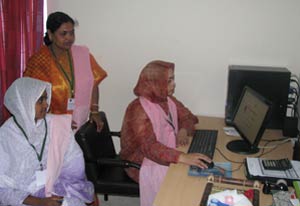Researchers advance cancer care in Bangladesh
January/February 2011 | Volume 10, Issue 1
By Edward R. Winstead
Many women in Bangladesh struggle to find the resources just to feed their families. If they develop a health issue such as breast cancer, many don't seek treatment due to the cost and other barriers.
Wisconsin-based Dr. Richard Love and his International Breast Cancer Research Foundation are working to create four breast-problem clinics and one specialty outpatient diagnostic and treatment center in Bangladesh. Love, who is also a professor of medicine and public health at Ohio State University and grantee of the NIH's National Cancer Institute, believes that understanding the traditions of the people who live with cancer is critical to improving their health care.

Photo courtesy of NCI
Staff at Bangladesh's Breast Care Center developed the
first Web-based electronic medical record system in the
country.
The radiation center Love is planning would also provide education for patients and training for people interested in working in the field. No facilities for this kind of treatment currently exist anywhere in the Khulna region of Bangladesh; the researchers estimate that there are perhaps 18 operational radiation therapy facilities in the entire country, whereas approximately 300 may be needed.
"Radiation is a really useful modality, especially for the locally advanced cancers you tend to see in this population," said Dr. Norman Coleman, who is associate director of the Radiation Research Program at NCI and who has consulted on the project as a private citizen. "Dr. Love has defined a need, and he's successfully conducted clinical trials in the region because he's there on the ground. The question now is whether he can get philanthropic support."
There are not only economic barriers to providing treatment to the poor, uninsured population but cultural challenges as well.
"Human rights issues stand in the way of doing anything about cancer," Love said. "If you can get over the economic issues and the health-system issues, you're still left with daunting cultural challenges and you need to find a way around these."
These challenges became evident when the researchers were trying to recruit women to a clinical trial. Accrual was slow in part because few health services existed for the women and most women felt that, because of their place in the family, they should not seek help. The researchers are now trying to develop a team of social scientists to investigate the complex issues that may explain this behavior and to test some interventions.
The researchers developed the country's first free walk-in breast clinic, where women are seen by a female doctor and a medical assistant, who provide advice and supportive care.
Love has made progress in planning the new radiation therapy center. The current proposal estimates that many patients could receive a course of radiation treatments for $125, compared with thousands of dollars in the United States.
Through technologies that now exist, radiotherapists in the United States can work closely with colleagues in places like Bangladesh. Using "dummy" human tissues that have devices for measuring radiation, workers in a remote center can test their radiation machines to make sure they are delivering the specified dose. Furthermore, radiological data from remote locations can be deposited in a centralized location for a trial's principal investigators to review.
"These tools would be a good way to bring a place as remote as Bangladesh into cancer clinical trials," said Dr. James Deye, a colleague of Dr. Coleman's in NCI's Radiation Research Program. The technologies could provide assurance that a remote site is following the protocol of a particular trial and also be educational.
The center is being developed as a "social business," and any profits would go to its expansion. The hope is it could be a prototype for a successful social business in radiation therapy and could be replicated in other low-resource settings.
All articles in the special Focus on Cancer section were developed by the National Cancer Institute and originally published in the NCI Cancer Bulletin and were edited for space. View the full versions of the November 30, 2010 NCI Cancer Bulletin Special Issue: Global Collaboration.
To view Adobe PDF files,
download current, free accessible plug-ins from Adobe's website.